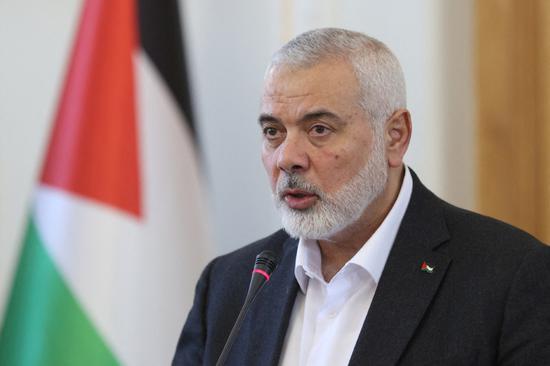OIC holds Tel Aviv responsible for assassination and urges end to support for Israel
The Organization of Islamic Cooperation held Israel responsible for the attack on Hamas leader while affirming Iran's right to retaliate in an Iran-initiated emergency meeting.
In a final communique adopted by the OIC and foreign ministers of its 57 member states on Aug 7, the OIC holds Israel "fully responsible for this heinous attack", the communique read, which it said constitutes "a crime of aggression, a flagrant violation of international law and the UN Charter and a serious infringement of the sovereignty, territorial integrity and national security of the Islamic Republic of Iran".
Ismail Haniyeh, former Palestinian prime minister and head of Hamas' political bureau, was assassinated in the Iranian capital Teheran on July 31 by a projectile attack against his residence.
The Muslim bloc called on refraining from engaging in any kind of assistance, cooperation, or support to Israel, which it called "the occupying power".
They said such support "would prolong Israel's illegal occupation of the Palestinian territory", grant it impunity, and embolden it to "continue its crimes and flagrant violations of international law and relevant UN resolutions". And key powers in the international community are called to uphold their responsibilities in ending the 10-month conflict in Gaza.
Iranian Foreign Ministry spokesman Nasser Kanaani said on his X account that in the terminology of the U.S. and Europe, those who defend their land against foreign occupation forces and fight for their home, family, and human dignity are branded terrorists.
Similarly, any party who supported oppressed people under occupation "is a sponsor of terrorism", he said.
This is in contrast to the West's view of Israel, he said.
"The occupying regime and killer of more than 40,000 people in 10 months — of whom about 10,000 are children — is not branded terrorist, but deserves ovation and applause and all-out political, security, military and arms support," Kanaani wrote.
"The West has lost its integrity and honor in the Gaza war and is seriously suffering moral decay and civilizational collapse," he added.
Tensions remained high this week following Haniyeh's assassination. Iran, Palestine's Hamas, and Lebanon-based Hezbollah have threatened to retaliate against Israel.
The ongoing conflict has already prompted some governments to issue travel advisories for their citizens in Middle Eastern countries or those planning to travel there to avoid the conflict hotspots.
The United States, the United Kingdom, and France appealed to their citizens to immediately leave Lebanon.
U.S. Secretary of State Antony Blinken said that "no one should escalate" the conflict in the Middle East. He said that the U.S. has been engaged in intense diplomacy with its partners and had communicated directly to Iran and Israel.
He reiterated that the U.S. would continue to defend Israel against attacks from terrorist groups or their sponsors, just as they would "continue to defend our troops".
"It's urgent that everyone in the region takes stock of the situation, understand the risk of miscalculation, and make decisions that will calm tensions and not exacerbate them," said Blinken.
His comments came during a joint press conference with U.S. Defense Secretary Lloyd Austin, Australian Foreign Minister Penny Wong, and Australian Deputy Prime Minister and Defense Minister Richard Marles in Annapolis, Maryland, U.S..
Arhama Siddiqa, a Middle East analyst and research fellow at the Institute of Strategic Studies Islamabad in Pakistan, told China Daily it was "no secret" that U.S. support for Israel has long been a cornerstone of its foreign policy and deeply rooted in historical precedent.
"The Zionist lobby wields considerable influence over American political, economic, and social spheres. However, every action has its limits, and now U.S. support for Israel is generating significant backlash," said Siddiqa.
She said if the U.S. were to navigate this turmoil, the Biden administration must pressure Netanyahu into agreeing to a cease-fire as the Israeli prime minister's actions "are central to the ongoing conflict".
"The U.S. currently has a narrow window of opportunity to address the severe and unprecedented backlash (against Israel). This moment is critical, as domestic and international criticism has reached an all-time high," said Siddiqa.
Jordanian Foreign Minister Ayman Safadi told CNN that he believed a cease-fire could be achieved but lamented the actions of Netanyahu.
"The challenge that we have is that every time we get near, Israel does something that complicates the situation further, including, the assassination of Ismail Haniyeh in the middle of negotiations," Safadi told CNN.
Safadi said their message to the world was "enough is enough" and that the only path forward was to bring about an immediate cease-fire that would help de-escalate the regional situation.
This will "save the region from the abyss of further conflict" and protect it from "the agenda of Netanyahu who continues to provoke, continues to escalate", he said.
"So, the question is do we allow Netanyahu and his radical government to impose their agenda on the region and doom it to a future of more conflict?"
"Or do we do what we all believe is right and bring about that permanent and immediate cease-fire and then work with everybody to make sure that we are on a path that will ensure that everything that has happened since Oct 7 does not happen again?", referring to the day that Hamas militants launched a surprise attack on Israel.

